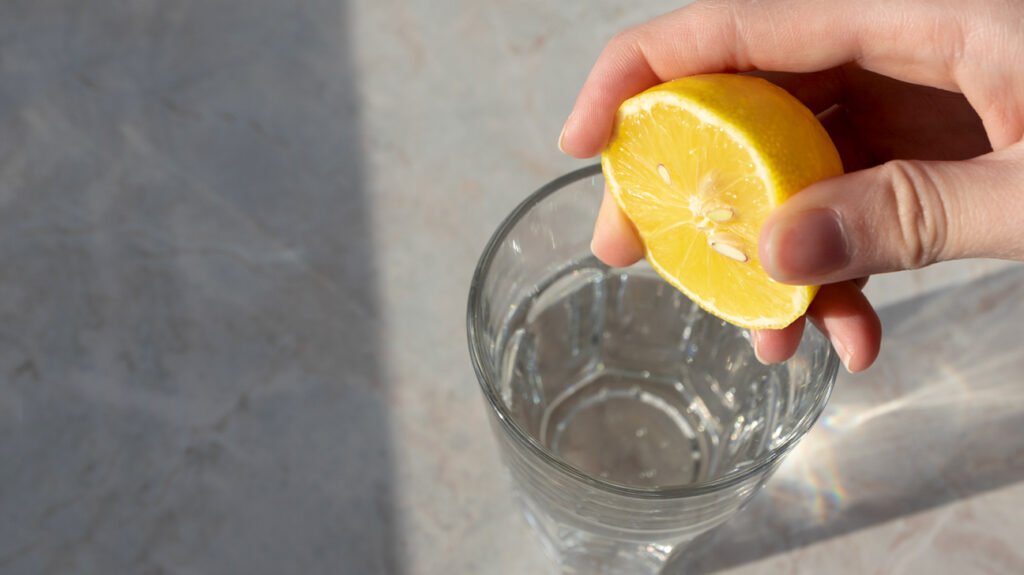Table of Contents
Why is lemon water recommended?
- High in vitamin C – two lemons provide daily requirement
- Counteracts kidney stones
- Provides numerous health benefits
The health benefits of vitamin C
- Prevents bleeding gums and scurvy
- Reduces fatigue
- Helps with spider veins and varicose veins
- Maintains collagen, preventing loose skin
- Supports adrenal function
- Prevents nosebleeds and bruising
- Strengthens blood vessel walls, preventing micro-hemorrhaging
How does vitamin C deficiency affect cardiovascular health?
- Causes micro-hemorrhaging in arteries
- Leads to cholesterol and calcium buildup, clogging arteries
- Can contribute to aneurysms and potential strokes
Sources of vitamin C
- Vegetables
- Citrus fruits
- Lemon water
- Pure lemon juice (2-4 tablespoons = 1 lemon)
How to make lemon water?
- Add lemon juice to water (at least once a day)
- Can add apple cider vinegar for additional benefits
- Optional: add stevia for sweetness
How does lemon water help with kidney stones?
- Counteracts the formation of kidney stones
- Citrates from lemon dissolve existing stones and prevent new ones
- Helps balance oxalates from foods like spinach, kale, lentils, beans, and nuts
Want to feel healthier and more energized? Lemon Water is a simple yet powerful drink that can make a big difference! Learn how this refreshing beverage can boost your vitamin C intake, help prevent kidney stones, and improve your overall well-being.
So let’s dive into the details…
The Importance of Vitamin C

Lemons and Vitamin C
In this topic, we’re gonna talk about lemon water and the importance of it. I recommend it for all my clients, not necessarily just for the vitamin C, because it does have a lot of vitamin C.
In fact, two lemons a day will give you all the vitamin C that you need for the entire day.
- Lemon water is recommended for everyone.
- Lemon water is a good source of Vitamin C.
- Two lemons provide the daily recommended amount of Vitamin C.
Health Benefits of Vitamin C

Benefits of Vitamin C
And just as a side note, vitamin C, what is it good for? Bleeding gums. If you brush your teeth and you get a little redness on there, that means you’re deficient in vitamin C.
It’s a mild version of scurvy. Fatigue. That’s one. Spider veins, varicose veins. Loss of collagen, so you get loose skin.
- Vitamin C deficiency can lead to:
- Bleeding gums
- Fatigue
- Spider veins & varicose veins
- Loss of collagen & loose skin
Vitamin C and Adrenals
And by the way, your adrenals hold a lot of vitamin C. So that’s the storage, so it can make more collagen, so that’s why adrenal cases, burnt out adrenals, they have a loss of collagen or protein.
Nosebleeds, bruising, but the most important thing to think about or consider is micro hemorrhaging of the arteries.
- Adrenals store Vitamin C for collagen production.
- Adrenal fatigue can lead to collagen loss.
Vitamin C and Artery Health
What does that mean? It means that there’s little bleeding lesions that occur in your blood vessels from a vitamin C deficiency, and what happens?
The cholesterol and the calcium come in there and plug it up as a band-aid, and that’s what clogs arteries. It’s not the cholesterol in the fat. It’s the micro-hemorrhage, the damage in the artery first, then the other ones come later, okay?
- Vitamin C deficiency can lead to micro-hemorrhaging in arteries.
- This can contribute to clogged arteries.
| IssueRelation to Vitamin C Deficiency | |
|---|---|
| Micro-hemorrhaging | Caused by deficiency |
| Clogged Arteries | Result of micro-hemorrhaging |
Vitamin C and Aneurysms
And even with an artery that has an aneurysm that can turn into a stroke eventually, if it blows out, that’s the vitamin C deficiency, because vitamin C strengthens the walls of the capillaries and arteries, okay? So you can see the importance of vitamin C.
- Aneurysms can be linked to Vitamin C deficiency.
- Vitamin C strengthens blood vessel walls.
- Vitamin C deficiency leads to weakened blood vessels.
- This can result in aneurysms and potential strokes.
Sources of Vitamin C

Getting Your Daily Dose
You can get vitamin C from vegetables, citrus, lemon, lemon water, or also you can use actual lemon juice. I like to use a pure lemon, like an organic blend, and like two to four tablespoons would be one lemon, okay? And you put that in your water.
- Sources of Vitamin C:
- Vegetables
- Citrus fruits
- Lemon
- Lemon water
- Lemon juice
- 2-4 tablespoons of organic lemon juice equals one lemon
Why drink lemon water?
Benefits of Lemon Water
Have it at least once a day, okay? If you were to add some apple cider vinegar in there, you could also create a nice little drink, and you could even add a little, a couple drops of Stevia to make a nice little lemonade, okay?
Now, why do we need lemon? Why do we need lemon water? Okay, the most important is it counteracts kidney stones.
- Lemon water can be consumed daily.
- Consider adding apple cider vinegar and stevia.
- Lemon water helps prevent kidney stones.
Oxalates and Kidney Stones

Now, when you eat certain foods, like healthy foods, like spinach, kale, if you eat lentils, beans, nuts, they’re high in something called oxalates, okay?
And if you combine oxalates with too much calcium, so if you have too much oxalate and too much calcium in the kidney, you could develop kidney stones, okay?
That’s the most common source of kidney stones, and that can be a very, very painful.
- Foods high in oxalates:
- Spinach
- Kale
- Lentils
- Beans
- Nuts
- High oxalate + high calcium in the kidney can lead to kidney stones.
Citrates and Kidney Stone Prevention
So citrates from the lemon or lime will dissolve the stones or prevent the stones from growing, okay? That is the biggest purpose of lemon water.
It counters and protects you against the kidney stones. It dissolves them, and your body even makes citrates, but if it’s deficient in that, you need to add it externally from lemons or limes,
which are almost identical, as far as the citrates, and that way you can prevent stones and continue to have foods high in oxalates, like kale, cruciferous, all the different, broccoli and things like that.
- Citrates from lemon or lime dissolve and prevent kidney stones.
- Lemon water is a good source of citrates.
Conclusion
So that’s what I recommend. Have your water, not just plain, but always add some lemon in it, and you can use it from a bottle as well. I’ll see you in the next topic.
- Drink lemon water daily!
- You can use bottled lemon juice.
Summary
Lemons have a lot of vitamin C. Only two lemons a day will give you all of the vitamin C you need for the day.
What is vitamin C beneficial for?
• Bleeding gums
• Fatigue
• Spider veins
• Loss of collagen
• Nose bleeds
• Bruising
• Micro hemorrhaging
- You can get vitamin C from vegetables, citrus, or pure organic lemon juice. 2-4 tablespoons are equal to about one lemon. Mix this in your water and have it at least once a day.
- Lemon water also helps counteract kidney stones. Even some health foods are high in oxalates. If you combine too many oxalates and too much calcium in the kidney, you could develop kidney stones. Citrates from lemons or limes can help counter and protect you against kidney stones.
FAQ
What happens if I drink lemon water every day?
Drinking lemon water daily can lead to several potential health benefits:
- Improved hydration and digestion
- Boost in vitamin C intake
- Potential aid in weight management
- Support for skin health
- Possible reduction in kidney stone formation
- Fresh breath and better oral health
However, it’s important to note that excessive consumption may lead to tooth enamel erosion or acid reflux in some individuals.
Does lemon water cleanse the kidneys?
While lemon water isn’t a miracle kidney cleanser, it can support kidney health:
- Increases urine output, helping flush toxins
- Provides citric acid, which may prevent certain types of kidney stones
- Supports overall hydration, crucial for kidney function
- May help balance urine pH levels
It’s important to note that while beneficial, lemon water should be part of a balanced diet and healthy lifestyle for optimal kidney health.
Why lemon is so powerful?
Lemons are considered powerful due to their rich nutritional profile and potential health benefits:
- High in vitamin C, a potent antioxidant
- Contains flavonoids with anti-inflammatory properties
- Rich in citric acid, which aids digestion and may prevent kidney stones
- Low in calories but high in flavor, making it useful for weight management
- Antibacterial and antiviral properties
- May help stabilize blood sugar levels
These properties make lemons a versatile and beneficial addition to a healthy diet.
Disadvantages of drinking lemon water daily
While generally beneficial, daily lemon water consumption may have some drawbacks:
- Tooth enamel erosion due to citric acid
- Potential heartburn or acid reflux in sensitive individuals
- Increased bathroom visits due to its diuretic effect
- Possible canker sores in some people
- Interaction with certain medications
- Potential iron deficiency if consumed with iron-rich foods
To minimize these risks, use a straw, rinse your mouth after drinking, and consult with a healthcare provider if you have specific health concerns.
What happens when you drink lemon water for 7 days
After a week of consistent lemon water consumption, you may notice:
- Improved hydration and skin appearance
- Better digestion and reduced bloating
- Increased energy levels
- Fresher breath
- Potential mild weight loss
- Boosted immune system
However, individual results may vary, and significant health changes typically require longer-term lifestyle modifications.
Side effects of lemon water for female
While lemon water is generally safe, some potential side effects for women include:
- Increased risk of enamel erosion, especially during pregnancy when morning sickness is common
- Potential exacerbation of heartburn, which is already more common in pregnant women
- Increased frequency of urination, which may be inconvenient during pregnancy
- Possible interference with iron absorption if consumed with iron-rich foods
Women should consult their healthcare provider before making significant dietary changes, especially during pregnancy or while breastfeeding.
How to make lemon water
To make refreshing lemon water:
- Wash a fresh lemon thoroughly
- Cut the lemon in half and squeeze the juice into a glass of water
- For added flavor, you can include some lemon zest or slices
- Optionally, add a small amount of honey or mint for extra taste
- Stir well and enjoy
For best results, use room temperature or warm water, as it may aid in digestion. Cold lemon water can be refreshing but may be harder on your digestive system.
Hot lemon water benefits in the morning
Starting your day with hot lemon water can offer several benefits:
- Boosts metabolism and aids in weight management
- Stimulates digestion and promotes regular bowel movements
- Provides a natural energy boost without caffeine
- Helps rehydrate the body after sleep
- Supports the immune system with vitamin C
- May help balance pH levels in the body
For optimal benefits, drink it on an empty stomach about 20-30 minutes before breakfast.
Best time to drink lemon water
While lemon water can be beneficial at any time, certain times may maximize its effects:
- First thing in the morning: Aids digestion and provides an energy boost
- Before meals: May improve digestion and help with weight management
- After workouts: Helps replenish fluids and electrolytes
- Before bedtime: May help detoxification processes during sleep (use room temperature water)
Consistency is key, so find a time that works best for your schedule and stick to it.
What happens when you drink lemon water for 30 days
After a month of regular lemon water consumption, you might experience:
- Improved digestion and reduced bloating
- Clearer, more radiant skin
- Potential weight loss, especially if replacing high-calorie drinks
- Stronger immune system
- Better hydration habits
- Reduced cravings for sugary drinks
- Possible improvement in kidney health
Remember, these benefits are most likely when lemon water is part of an overall healthy lifestyle.
Overnight lemon water benefits
Preparing lemon water and leaving it overnight may offer unique benefits:
- Increased extraction of vitamins and minerals from the lemon
- Enhanced antioxidant properties
- Easier to drink first thing in the morning
- May aid in detoxification processes
- Convenient way to ensure consistent lemon water consumption
To prepare, slice a lemon and add it to a pitcher of water. Refrigerate overnight and consume within 24 hours for best results.




